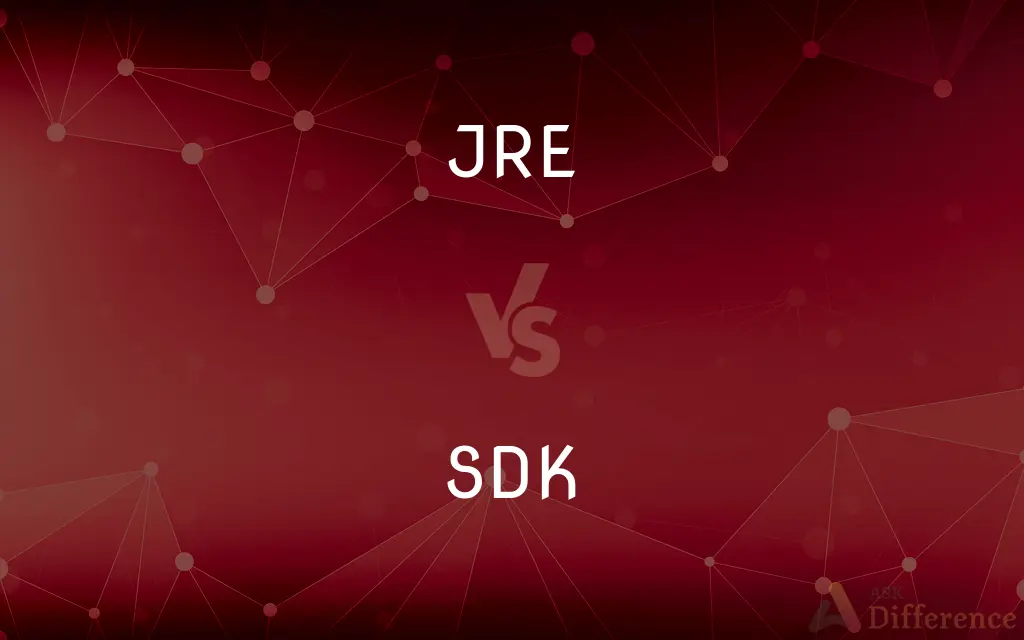JRE vs. SDK — What's the Difference?
By Tayyaba Rehman — Published on October 28, 2023
JRE (Java Runtime Environment) allows Java applications to run; SDK (Software Development Kit) provides tools to develop software.

Difference Between JRE and SDK
Table of Contents
ADVERTISEMENT
Key Differences
JRE, or Java Runtime Environment, is a package of software components that enables the execution of Java applications. SDK, or Software Development Kit, is a set of development tools and libraries that assist developers in building software applications.
While JRE is primarily concerned with providing the necessary runtime libraries, virtual machines, and other components to run a Java application, SDK encompasses a broader spectrum. SDK, in its most general sense, may include compilers, debuggers, documentation, and more, which facilitate the software development process.
One might consider JRE as a subset within the broader category of SDKs. Specifically, when referring to the Java SDK (often known as JDK or Java Development Kit), it includes the JRE along with tools for developing Java applications. Hence, you can say that SDK serves a dual purpose: it provides tools for development and components for execution, with JRE being responsible for the latter.
It is worth noting that while JRE is a term closely associated with Java, SDK is a universal term. Software development kits are available for various programming languages and platforms, and their primary function is to streamline and standardize the development process. In contrast, JRE is specific to ensuring that Java applications function as intended on any machine.
To sum it up, JRE is about running Java applications, ensuring they operate smoothly and consistently. SDK is about creating applications, offering developers the tools, libraries, and documentation needed to build software efficiently.
ADVERTISEMENT
Comparison Chart
Primary Function
Runs Java applications
Provides tools for software development
Scope
Specific to Java
Universal (available for various languages & platforms)
Includes
Libraries, JVM
Compilers, debuggers, libraries, documentation
Relation to Java
Integral part
JDK (a type of SDK) includes JRE
Usage
Required for end-users running Java apps
Required for developers building software applications
Compare with Definitions
JRE
Contains libraries and JVM.
The JRE ensures Java programs run consistently on any machine.
SDK
A toolkit for software developers.
The game's SDK allows for extensive modding.
JRE
Subset of Java's SDK (JDK).
While JDK is for developers, JRE is for end-users.
SDK
Specific to a programming language or platform.
The Android SDK offers tools tailored for the platform.
JRE
A software package for Java applications.
To run this Java app, you need the JRE installed.
SDK
Often includes runtime environments.
Java's SDK, known as JDK, comprises the JRE.
JRE
Platform-independent runtime.
Thanks to JRE, Java boasts its 'Write Once, Run Anywhere' capability.
SDK
Facilitates software creation and testing.
Leveraging the SDK, developers can efficiently build and test their apps.
JRE
Essential for executing Java programs.
Without the JRE, you can't execute Java-based software.
SDK
Includes tools, libraries, and documentation.
With the right SDK, software development becomes more streamlined.
Common Curiosities
Is SDK exclusive to Java?
No, SDKs exist for various programming languages and platforms.
What does JRE stand for?
JRE stands for Java Runtime Environment.
Why would an average user need JRE?
To run Java-based software applications on their computer.
Why is JRE essential for Java applications?
JRE provides the necessary runtime components to execute Java apps.
Is JDK a type of SDK?
Yes, JDK (Java Development Kit) is an SDK specifically for Java.
Do I need JRE if I have JDK?
No, JDK includes JRE within it.
Can I develop Java applications with just the JRE?
No, you'd need the JDK (which includes JRE) for development.
How is SDK different from JRE?
While JRE allows Java applications to run, SDK provides tools for software development.
Does every programming language have an SDK?
Most modern languages offer SDKs to streamline development.
Can I run a Java application without JRE?
No, JRE is essential to run Java applications.
What might be included in an SDK?
Compilers, debuggers, libraries, documentation, and sometimes runtime environments.
Do all software applications require a runtime like JRE?
Not all, but many languages have runtimes to execute applications written in them.
If I'm not a developer, do I need an SDK?
Typically, no. End-users generally only need runtimes like JRE.
How do I know which version of JRE I have?
You can use the command 'java -version' in the terminal or command prompt.
Share Your Discovery

Previous Comparison
Income Statement vs. Cash Flow Statement
Next Comparison
Gillette Fusion vs. Fusion PowerAuthor Spotlight
Written by
Tayyaba RehmanTayyaba Rehman is a distinguished writer, currently serving as a primary contributor to askdifference.com. As a researcher in semantics and etymology, Tayyaba's passion for the complexity of languages and their distinctions has found a perfect home on the platform. Tayyaba delves into the intricacies of language, distinguishing between commonly confused words and phrases, thereby providing clarity for readers worldwide.
















































